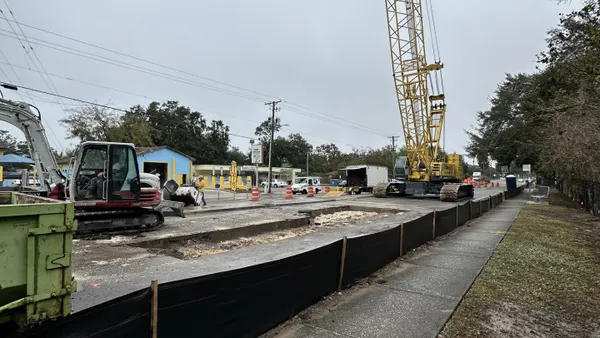Dive Brief:
- In preparation for a state budget deadlock, the Illinois Department of Transportation has told all state highway contractors to get ready for a complete shutdown on July 1, leaving $2 billion of projects in limbo, WGN-TV reported.
- IDOT sent a note to its contractors telling them to secure all potential hazards by June 30 and to cease all new work that can't be completed by that date.
- It is possible that Illinois lawmakers could pass a stopgap spending bill, but if it does not include a provision for construction spending, all IDOT projects will grind to a halt until legislators pass a budget bill.
Dive Insight:
IDOT officials told WGN-TV that it sent the note to contractors now so that they would have enough time to shut down their operations safely.
Earlier this month, the IDOT announced a six-year, $11 billion infrastructure repair program — $2.8 billion more than its previous plan — that is part of the state budget over which lawmakers are currently battling. The plan targets 501 bridges and 2,523 miles of road, all in need of an overhaul. Even if the state approves the IDOT's plans, which will also receive a $134 million-per-year federal contribution via the FAST Act, the agency said that it would still have to "work with all stakeholders on a long-term, sustainable solution" to deal with an anticipated state revenue shortfall.
Illinois is just one of several states dealing with disputes over infrastructure funding. In May, Minnesota lawmakers introduced a $1.8 billion bonding bill to tackle more than 300 state infrastructure and other public projects, but the measure fell one vote shy of passage. Prior to the vote, both House and Senate Republicans said the bill, which included funding for a $33 million emergency operations center and a $22 million security upgrade for the state Capitol, was too large.
As states scramble to fund their highway projects, a recent American Society of Civil Engineers infrastructure report found that the U.S. will be facing a $1.44 trillion infrastructure funding shortfall over the next 10 years that could develop into $5.18 trillion by 2040. The ASCE said a lack of necessary public works funding could put 2.5 million U.S. jobs and $4 trillion in gross domestic product in jeopardy, adding that private investment could be a key to closing the gap.









